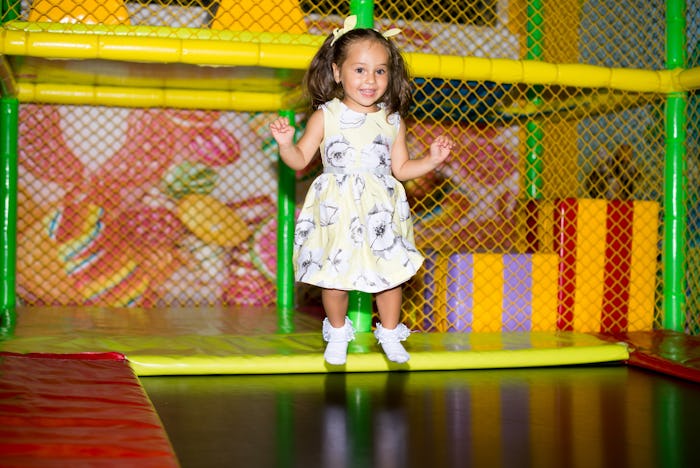Life
Here's When Toddlers Can Actually Jump — It's Later Than You Think
If you are the parent of a young toddler or have been around one lately, you might have heard them claim to 'jump' when their feet really haven't left the ground. I remember that phase well, and I also remember thinking, how hard can it be? As it turns out, it's not one of the first tricks toddlers master. So when can toddlers jump? It takes practice.
Toddlers can typically jump between the ages of 2 and 3. After they learn to walk, they'll start to lift one foot off the ground at the same time, practicing balancing without both feet planted, according to What to Expect. "Jumping takes coordination, strength and, most of all, courage," reported What to Expect. Once babies learn to walk, they start testing out their balance, eventually trying a jump from a low surface to the ground before jumping from standing, which is, surprisingly, harder. Most toddlers master jumping from standing by 26 months, but "your little leapfrog might demonstrate her jump as early as 21 months," explained What to Expect.
If your toddler isn't showing much interest in leaving the ground with two feet, you can encourage her to learn that important motor skill with a few simple tricks. Day2Day Parenting suggested: "Make a chalk line on the sidewalk or place a washcloth on the floor. Show your child how to jump with both feet together and see how far each kangaroo can jump." Making learning the skill a game that mimics animals can help keep the practice enjoyable for everyone. The site also suggested using bubbles to get your toddler airborne: "Blow bubbles up high and watch your child jump and try to pop the bubbles by clapping its hands. Switch and blow the bubbles towards the ground so it can stomp on them."
Learning how to jump is a toddler-milestone you'll want to encourage your little one to make by the time they turn 3 years old. If your toddler isn't responding to animal jumping tricks, checking in with your pediatrician might be a good idea.
Once your toddler starts walking, it might seem like you're off the hook on the milestones. However, it doesn't stop there. Toddlers have quite a few milestones you need to be watching out for and you should keep encouraging them to hit them. Pathways, a not-for-profit that gives information about childhood and development to parents and caregivers, explained that between 2-3 years old, kids should be able to plays with toys without mouthing them, should be able to self-soothe to sleep at night, and use both hands to explore toys, just to name a few.
So what does it mean if your toddler isn't hitting the recommended milestones? The website Understood, a site that helps people with learning and attention issues, said, "Not meeting these types of milestones isn’t always a sign that your child has a developmental delay. If it turns out he does have a delay, however, getting support and services early may help him catch up more quickly." So while it may not seem like a big deal that your toddler can't jump by the time they're, it doesn't necessarily mean that there's a bigger issue at hand. Likewise, it can't hurt to ask your pediatrician about it either.
